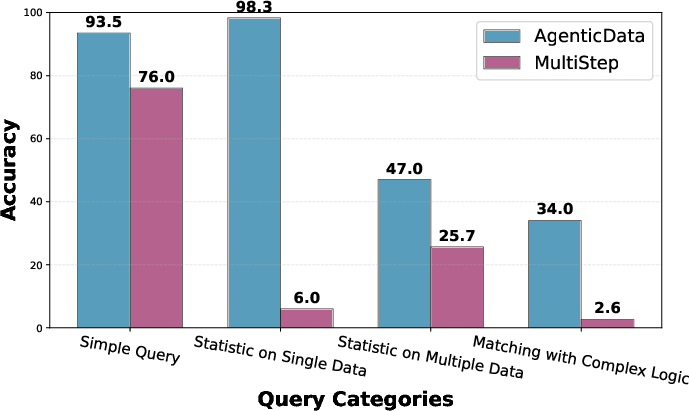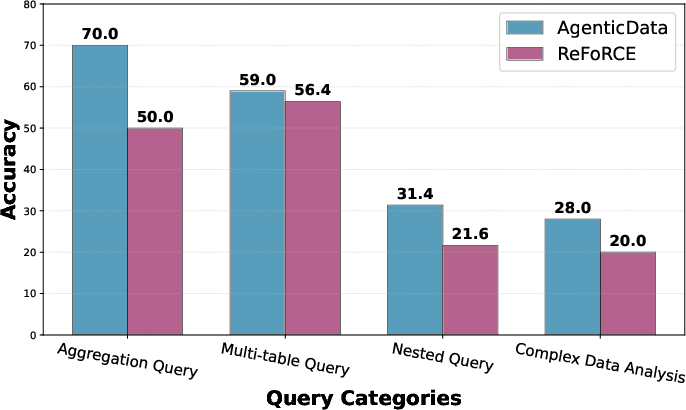- The paper introduces AgenticData, a multi-agent system that autonomously transforms NL queries into logical plans for heterogeneous data analysis.
- It validates generated plans using cross-validation and hierarchical segmentation to ensure high accuracy and reduce errors.
- Experimental results demonstrate up to 94.44% accuracy on benchmarks like DABStep while significantly reducing computational costs.
An Agentic Data Analytics System for Heterogeneous Data
This essay examines the paper titled "AgenticData: An Agentic Data Analytics System for Heterogeneous Data" (2508.05002), which introduces AgenticData, a multi-agent system for performing data analytics across both structured and unstructured data sets. The paper addresses key limitations in existing systems by leveraging advanced multi-agent collaboration and feedback-driven planning techniques.
Introduction to AgenticData
AgenticData is positioned as a novel data analytics system that eliminates the heavy reliance on expert-driven coding and workflow management traditionally associated with analyzing heterogeneous data. It operates by interpreting natural language (NL) queries to autonomously process data via a feedback-based network of collaborative agents. These agents utilize both structured and unstructured data sources, overcoming the limitations of traditional methods reliant on static schemas and SQL extensions. This system is particularly valuable in environments where unstructured data is prevalent and schema extraction is challenging.
System Architecture
AgenticData's architecture is characterized by its multi-agent design, which includes data profiling, planning, and manipulation agents. These agents form a tightly integrated system that translates NL queries into semantic plans, verified for logical accuracy and optimized for execution.
Planner and Memory Management
Key to the system is its planner, which employs a series of agents to generate logical plans. The memory management component of AgenticData, particularly the smart memory mechanism, plays a crucial role by preserving context and learning from feedback, offering solutions to common errors, and managing agent-specific information through a structured process of error categorization and feedback dissemination.

Figure 1: Architecture of Our AgenticData System.
Plan Validation and Optimization
AgenticData incorporates a robust validation mechanism to ensure the logical integrity of generated plans, employing cross-validation techniques to minimize potential hallucinations during plan execution. The paper also details a three-step optimization process that mitigates LLM costs while maintaining semantic and relational operation fidelity. The optimization process effectively reduces execution costs by prioritizing the execution of relational operators and balancing the accuracy versus cost trade-offs of LLM usage within query execution.
Semantic Task Planning
The semantic task planning framework within AgenticData incorporates a comprehensive workflow for task disassembly and logical plan creation. By leveraging hierarchical segmentation for semantic catalog construction and advanced planning agents, the system enhances its ability to accurately interpret and execute data analysis tasks.
Experimental Results
AgenticData's efficacy is supported by its performance on standard benchmarks, such as DABStep, Wikipedia, and Spider-2.0-Lite, showcasing its superior accuracy compared to baseline methods. Specifically, the system achieved a 94.44% accuracy on easy tasks within DABStep (Figure 2) and demonstrated cost efficiency on the Wikipedia benchmark, achieving significant cost reductions while maintaining high-quality outputs.


Figure 2: Accuracy on DABStep.
The system's ability to consistently perform with lower iteration counts and faster execution times positions it as a highly efficient solution, especially when dealing with large, heterogeneous data environments.
Conclusion
The paper presents AgenticData as an innovative solution to the challenges of data analytics across heterogeneous data environments, offering significant improvements in both accuracy and computational cost management. Through its agentic framework and advanced plan optimization techniques, AgenticData sets a new benchmark for autonomous data analysis systems capable of efficiently processing both structured and unstructured data sources, ultimately enabling enhanced insights with minimal human intervention. The documented results offer a promising outlook for future developments in AI-driven data analytics, potentially expanding into more diverse application domains.




